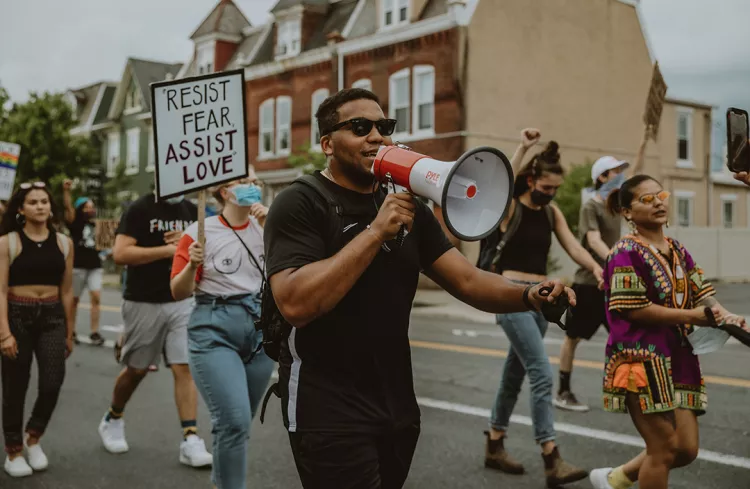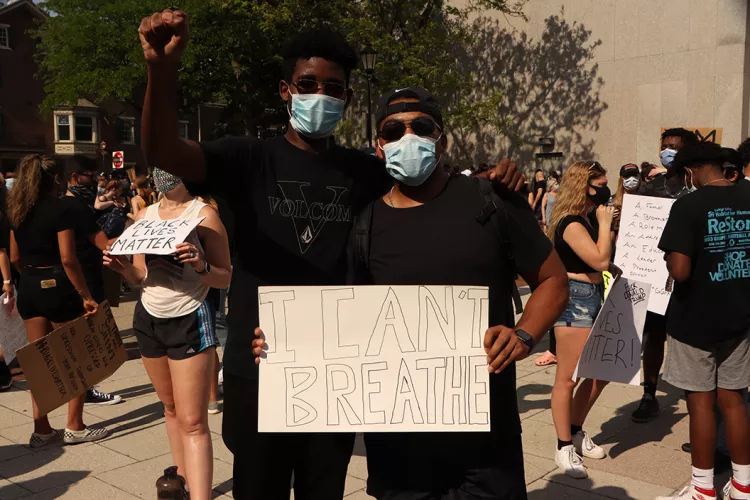The Front Lines of Change: Making the Black Experience Visible

“Black people have been dealing with their trauma, and our trauma, and the trauma of existing in the United States since 1619," says Joel Paulson ’22. "And only a few times in the history of this country, I’d say, has it been under a microscope like it is right now.” Photo by Rebecca Aon.
For many Swarthmore students, the summer of 2020 has been a time of activism and agency as they organize, overcoming COVID-19 limitations, and work to make positive change in their communities through a variety of initiatives. This is the first in a series of stories about their effort and success in engagement for social justice.
When Joel Paulson ’22 watched as the death of George Floyd ignited large-scale protests in Minneapolis, he wasn’t optimistic that it would bring any change.
“I had a really cynical approach,” says Paulson, a political science and education double major from Hellertown, Pa., and member of the men’s lacrosse team. “I thought that this was going to be discussed for two weeks and then white people were going to get tired of about talking about it.”
But while visiting a friend in Washington, D.C., he attended Black Lives Matter (BLM) protests. The experiences were electrifying.
“I was like, ‘Wow, this is what change looks like,’” says Paulson. “Black people have been dealing with their trauma, and our trauma, and the trauma of existing in the United States since 1619. And only a few times in the history of this country, I’d say, has it been under a microscope like it is right now.”
Paulson has seen himself becoming an advocate for social and racial justice since he was a kid. He’s an adoptee who grew up Black in a 95% white town, and his younger sister has autism, all of which influenced his desire to eventually defend children as a civil rights litigator, he says; he’s even taking a constitutional law class this summer to prepare. But this spring and summer, he’s felt an increased sense of urgency to educate others.
With this goal in mind, Paulson took to social media, including Instagram and LinkedIn, to spread his message about the structural origins and personal consequences of racial inequality.
He attended and spoke at multiple BLM protests and rallies. He also created a blog with longtime friend and lacrosse teammate David Akinsooto ’23, who lives close to Hellertown. The weekly blog, Can You See Us?, discusses their experiences with racism as Black men.
In addition, Paulson has addressed on social media the weight that this moment places on already strained Black Americans. Initially, he was frustrated that his white friends and many other Americans were only now seeing a problem, and he was reluctant to engage as a result.
He says that he made the choice to get over that anger, but that Black Americans shouldn’t be expected to educate others as he is doing. He’s now working to shift his own efforts toward structural change.

“I never really thought that before the age of 20 or 22, I’d be able to say that I’m doing something that I’ve wanted to do since I was 8 or 12,” says Paulson (right). “I'm getting to do what I’ve always wanted to do, and use my platform and my voice to bring about change.” Photo by Anthony Mawindi.
Speaking at a rally in Hellertown, a borough with fewer than 6,000 people, he shared the concrete policy changes he’s hoping to see, which center on the U.S. secondary education system. Paulson spoke about how his public school education didn’t teach him about Juneteenth, the African American community of Seneca Village in New York City, Black Wall Street and the Tulsa massacre, the Black women who helped propel NASA’s success during the Space Race, or the Black trans activists who pioneered the Stonewall Riots.
“Black lives can’t matter until we are taught that they matter,” he told the crowd.
While Paulson says he recognized such deficiencies in his education early on, he credits several courses at the College for enriching his views on Black history and the U.S. education system.
With Professor of History Allison Dorsey, he has taken the Black studies and history classes African American History, 1619 to 1865, which the College recommends for teacher certification, and Black Reconstruction, which explores the “hard-won successes” and “splendid failures” that Black Americans secured after the Civil War.
Paulson also credits his adviser, Associate Professor of Educational Studies Edwin Mayorga, with whom he has also taken two classes, for helping shape his views on education. In Intro to Education, a popular course at the College, he studied critical theory and worked in a class at Strath Haven High School for students with emotional issues. Another course, From the Undercommons: Ethnic Studies and Education, explored the social impact that applying an ethnic studies lens to education can have.
“Both classes helped frame the current educational system for me in stark contrast to what it must become,” he says.
Paulson is grateful that he took the leap to activism now, rather than after earning his bachelor’s or law degree.
“I never really thought that before the age of 20 or 22, I’d be able to say that I’m doing something that I’ve wanted to do since I was 8 or 12,” he says. “I'm getting to do what I’ve always wanted to do, and use my platform and my voice to bring about change.”



